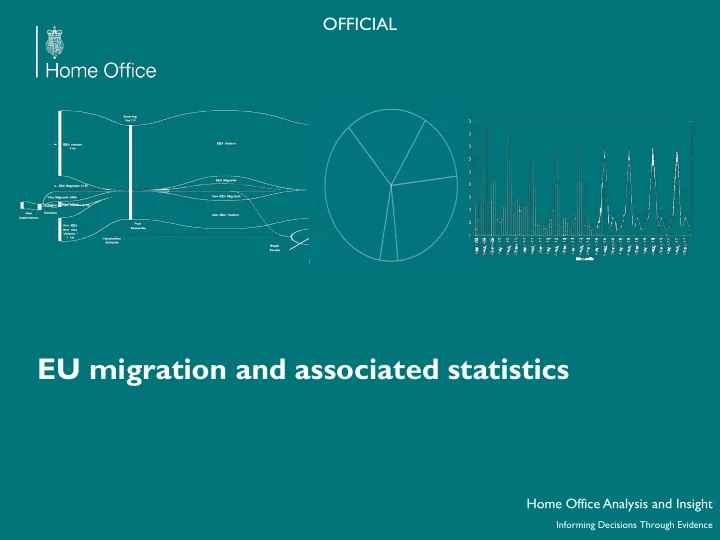

OFFICIAL EU migration and associated statistics Home Office Analysis and Insight Informing Decisions Through Evidence
Since the referendum result last summer... • The UK Government has set out its offer for EU citizens in the UK on their rights and status after the UK leaves the EU. • The UK government has made it absolutely clear how important it is that we secure, as early as possible, both the rights of EU citizens in the UK and UK nationals in EU Member States. • The policy paper ‘ Safeguarding the position of EU citizens in the UK and UK nationals in the EU’ sets out our offer to EU citizens and their families in the UK. We are seeking to provide EU citizens with certainty about their future. OFFICIAL Home Office Analysis and Insight
What is the offer for resident citizens? EU citizens and family members resident prior to a cut off date • EU citizens who have been living in the UK continuously for 5 years will be able to stay indefinitely by applying for ‘settled status’ . That means these citizens will be free to live here, have access to public funds and services and apply for British citizenship. • People who arrived before the cut-off date, but won’t have been resident in the UK for 5 years when we leave the EU, will also be able to stay. They will be able to apply for temporary leave to remain until they have accumulated five years residence after which they can then also apply for settled status. • Family dependants who are living with or join EU citizens before the UK’s exit will also be able to apply for settled status after 5 years in the UK. In these cases the cut-off date won’t apply. OFFICIAL Home Office Analysis and Insight
This policy is illustrated below OFFICIAL Home Office Analysis and Insight
Who are the resident population (1)? ONS have published estimates of the resident population in 2016 Estimated Resident EU Citizen Population by Nationality Group, 2016. Annual Population Survey 2016. Taken from ONS ‘Population of the UK by Country of Birth and Nationality: 2016’ • Around 3.6m (including Irish) or 3.2m (excluding Irish) EU citizens were estimated to be resident in the UK in 2016. • ONS estimate that in 2016 around 2.7m EU (including Irish) citizens were resident and aged 16-64. Of this 2.7m around 80% (2.2m) were estimated to be in employment. Annual Population Survey 2016. Taken from International immigration and the labour market, UK: 2016. OFFICIAL Home Office Analysis and Insight
Who are the resident population (2)? What type of work do EU nationals do? Annual Population Survey 2016. Taken from International immigration and the labour market, UK: 2016 • Sample survey analysis suggests resident EU nationals are estimated to have higher shares of employment in lower skilled occupations. OFFICIAL Home Office Analysis and Insight
There are limitations in estimates • For example, estimates of the resident population are subject to uncertainty through: – Sampling and weighting processes. – Limited coverage of communal establishments can mean likely undercounts of groups such as international students, short term migrants, and recent arrivals to the country in e.g. hotels/hostels. – Self reported data accuracy. • Given EU citizens have no need to apply for visas to undertake activity in the UK, our data sources are more limited than for visa nationals. OFFICIAL Home Office Analysis and Insight
What work is ongoing to develop the evidence base (1)? Work across Whitehall has been ongoing since the referendum • For example, we have looked to: – Undertake analysis of the role of longer term EU citizens in the labour market; – Better understand the role of short term migrant labour; – Develop understanding of the fiscal contributions/withdrawals of EU citizens; – Look to better understand how different data sources relate to each other. • We have been drawing on analytical tools, datasets and skills across Whitehall (including ONS) to help develop this evidence base on EU citizens. OFFICIAL Home Office Analysis and Insight
What work is ongoing to develop the evidence base (2)? The Government has commissioned the Migration Advisory Committee • The Migration Advisory Committee (MAC) have been commissioned to report on the impact on the UK labour market of the UK’s exit from the European Union and how the UK’s immigration system should be aligned with a modern industrial strategy. • The MAC are currently running a call for evidence seeking views and evidence from anyone with relevant knowledge, expertise or experience to help inform the MAC response. • This call for evidence closes on 27 th October, please see https://www.gov.uk/government/consultations/call-for-evidence-and-briefing- note-eea-workers-in-the-uk-labour-market for more details. • The MAC have also been commissioned to assess the impact of international students in the UK. OFFICIAL Home Office Analysis and Insight
Recommend
More recommend